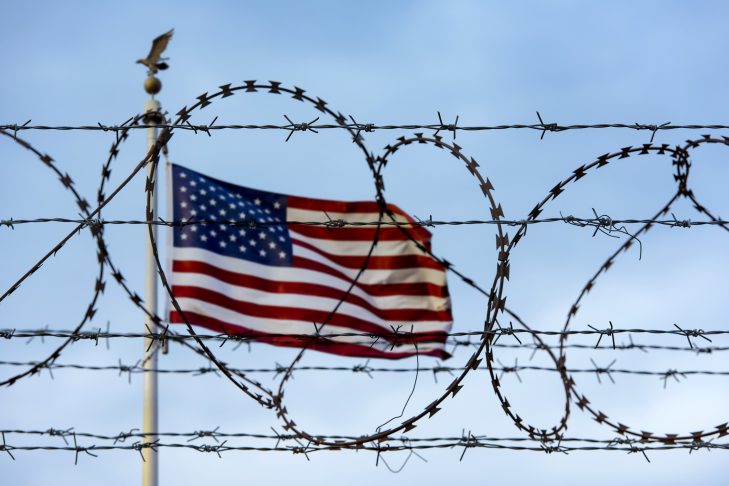I hear the thousands of hearts beating wildly on the southern border. Children are separated from their parents, and love and terror combine into its own arrhythmia. I also hear echoes of the Holocaust: children to the left; parents to the right. In Brownsville, Texas, 1,400 young boys are warehoused in an old building constructed of concrete and indifference. How many of them cry out in the deepest part of the night for their parents?
And for that matter, where are our girls?
A generation ago my family fled from firing squads, bread lines and black markets. They came to the United States with hope for amnesty. My family speaks Spanish, which makes this latest tragedy on the border so disorienting to me. I share a language and costumbres—customs—with these people. I am a Cuban-American, but I am also a Jew.
As a Jew whose family experienced multiple exiles, I once had a contingency plan for my children when they were little. It was shadowed by the memory of the Holocaust. The Nazis never persecuted my immediate family, but the Jewish people are my extended family. I imagined scenarios in which my children would survive a possible Holocaust in this country, only if they separated from me. I planned to send them to colleagues of my husband’s in Australia. They would grow up just enough to be able to handle the trip by themselves. I would order them to hold hands and never let go. Did the parents of the children imprisoned in Texas and beyond tell their children to do the same? Never let go—nunca dejar ir.
Every hour more hell comes over my newsfeed. I see pictures of children crying as their parents are searched; children who will be ultimately wrenched from their parents. Children who will be caged like animals.
When I was little, space travel was the news of the day. I was frightened of the astronauts bulked up in their layers of nylon and spandex and oxygen. Their mirrored helmets reflected barren, unknowable landscapes. This is what today’s border must look like to these children. It is a strange world made stranger by the fact that they no longer have their parents to navigate it for them.
Images of the astronauts holding on to a tether connected to their capsules as they floated in space caused me great anxiety. Nunca dejar ir. I now understand the tether functioned like an umbilical cord. The capsule provided nourishment and life itself to those astronauts. But it all felt so tentative, so fragile, as if the tether could break and the astronauts would be lost forever in time and space. The potential for a deadly free-fall kept me hyper-vigilant. I wouldn’t be surprised if the children on the border feel the same sort of hyper-vigilance—anxiety that strains their last nerves. Anxiety that makes them feel as if they are in their own crazy free-fall.
I’ve read that after their children are separated from them, some parents can hear them crying on the other side of a wall. Some parents are tricked. The authorities tell them they have to have their pictures taken, and when they come back their children are gone. Or they say the children need a bath. Need a bath? Remember when Jews were sent to showers? I don’t mean to say there is a full-blown Holocaust happening at the border. But these actions are close.
There is nothing worse for a parent than to be unable to protect her child. The first time I held my daughter, I knew I would die for her. More Holocaust-stained fantasies—something dark and dangerous and inhumane has been unleashed in this country. Children are no longer children; they are hostages. And the people who detain them, handcuff them, separate them from their parents, they’re ordinary people who got up in the morning and went to their jobs. It’s what Hannah Arendt called “the banality of evil.”
In 1938 the Evian Conference took place in France. Many have never heard of it, but what happened there is eerily pertinent. Thirty-two countries came together to decide what to do about the persecution of German Jews. None of the participating countries, except for the Dominican Republic, were willing to provide safe harbor. The Jews were sent back to Europe on ships, detained and then deported from various borders. That kind of handwringing is happening again. It’s happening as some parents are scheduled to be deported without their children. “I can’t go without my son,” pleads a mother.
Remember the Evian Conference.
A couple of weeks ago someone’s son was deported to Mexico. He was a teenager who had been in the United States since he was 3 years old. He was raised in Iowa and spoke English more fluently than Spanish. A few days after he was forced to return to Mexico, he was gunned down on the street. We are sending migrant children to their deaths.
Martin Niemöller, a Protestant pastor and outspoken critic of the Nazi regime, wrote a poem that has been often quoted. Some might dismiss it as cliché. But in these times, it is relevant all over again.
First they came for the Socialists, and I did not speak out—
Because I was not a Socialist.
Then they came for the Trade Unionists, and I did not speak out—
Because I was not a Trade Unionist.
Then they came for the Jews, and I did not speak out—
Because I was not a Jew.
Then they came for me—and there was no one left to speak for me.
Speak out for the children. Speak out for the migrants. Speak out until you can’t. And then speak out again and again.



